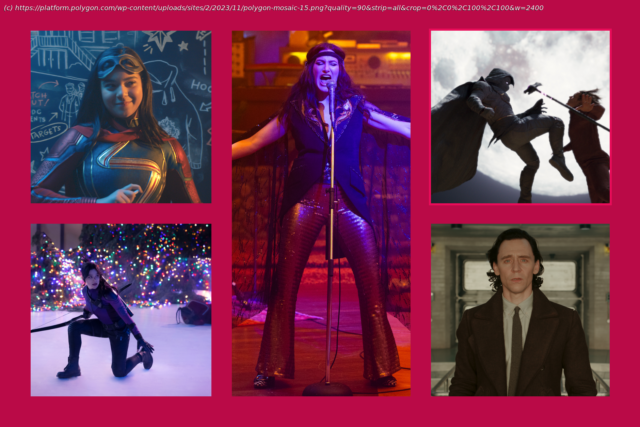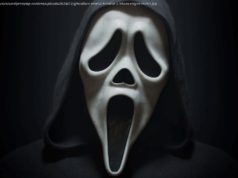From Agatha All Along to Loki to Jessica Jones and WandaVision, we rank the best MCU TV shows and the worst, and cover which Marvel shows are canon.
Which Marvel shows are canon Marvel Cinematic Universe and which aren’t? The fan debate rages on unchecked, but Marvel Studios president Kevin Feige semi-answered the question when he implied that the multiverse business that’s dominated the MCU for the last few years makes everything semi-canon, somewhere.
Still, some Marvel shows — particularly the Disney Plus run beginning with 2021’s WandaVision, the point where Marvel Studios stopped licensing its characters all over the place — are more canon than others. And some Marvel shows are better than others. Marvel Studios worked out a popular formula for its billion-dollar movies, then applied the same formula to its shows, better integrating them into the MCU, but also turning them into just one more vehicle for setting up future plotlines and characters while neglecting the story supposedly being told. How do other companies’ canon approaches to Marvel stories compare to that dynamic ? We put every installment of MCU-integrated TV on the same scale to rank them and find out.
[Ed. note: Not included on this list are pre-MCU Marvel shows like Blade, or Marvel shows that were specifically declared non-MCU canon in their day, like the excellent mind game Legion, the X-Men spinoff The Gifted, or the animated series Guardians of the Galaxy. Latest update: November 2024, to include What If…? season 2, Echo, and Agatha All Along.] 25. Helstrom (2020)
2020’s Helstrom was the last of the live-action MCU shows released on Hulu before the launch of Disney Plus, and it was canceled after one nearly universally panned season. The show is borderline unwatchable, a dour procession of exorcist and paranormal tropes with only the loosest connection to the comic book characters it’s based on. Following a pair of siblings with demonic blood that gives them superpowers, it lacks likable characters, meaningful stakes, nuanced performances, or even impressive special effects. If you’re looking for a spooky supernatural story about fighting demons, check out Evil on Paramount Plus. If you want superheroics, you’re better off watching anything else on this list. —Samantha Nelson24. Inhumans (2017)
Originally planned as an MCU movie and its own MCU sub-franchise, Inhumans suffered in part from the same thing that gave it so much potential: It’s built around an entire society hidden from the rest of the world, where separatist superpowered folk live according to their own laws. But a series about supers who aren’t attached to human society has none of the relatable aspects that make MCU characters interesting. And the story, about a coup that might turn the Inhumans’ awful, oppressive oligarchy into a different kind of awful, oppressive oligarchy, doesn’t have a lot of stakes for the average viewer.
When an alternate version of Inhumans’ Black Bolt (still played by Anson Mount) eventually turns up in Doctor Strange in the Multiverse of Madness, that gave MCU fans a lot more rooting interest in the character. But it still doesn’t make Inhumans any more interesting or watchable. The acting is stiff, the writing is clunky, bad guy Maximus (Iwan Rheon, famous for playing Game of Thrones sadist Ramsay Bolton) is ridiculously obvious in his clumsy evil, and even once the action moves from the moon to Earth, the story never feels like it’s about actual people. Technically, it’s all there in the series title, so we can’t say we weren’t warned. —Tasha Robinson23. Secret Invasion
If you gave me 14,000,605 tries to guess the events of the MCU version of Secret Invasion before it came out, I never would have gotten close. Unfortunately, in this instance, that isn’t a good thing. The Disney Plus show was never going to be much like the comic story it gets its name from — mostly a series of massive fights featuring every Marvel character you can think of, and a few more you couldn’t name if you tried. But leading up to release, it seemed like the show would at least involve some hidden identities and intrigue to go along with its all-star cast.
Instead, Secret Invasion never managed to do much of anything except disappoint fans. Its story, about a rogue sect of Skrulls infiltrating the ranks of world leaders and Earth’s mightiest heroes, kept gesturing at being a universe-shattering event. But it only amounted to a bland terrorist plot with one minor twist that didn’t change anything about the larger world of Marvel movies and shows. Worst of all, the show’s just pretty boring. Almost no one important turns out to be a secret disguised Skrull. Their Skrull plot doesn’t threaten anything particularly important. Every fight in the series looks like garbage, and there’s really no tension to speak of. Add all this onto the fact that it’s completely out of step with the plot of The Marvels, and it seems likely Secret Invasion is a show Disney and Marvel desperately want fans to forget. —Austen Goslin22. The Guardians of the Galaxy Holiday Special (2022)
James Gunn’s Christmas special featuring his take on Marvel’s Guardians of the Galaxy team is consciously cheesy, but the self-awareness doesn’t make it any less grating. At feature length, Gunn has much more space to veer between action, silly character bits, and sentiment, but the roughly 40-minute run time here makes all those twists feel rushed and clumsy, and the humor is particularly forced.
Marvel rounded up most of the GOTG regulars for this outing (apart from Zoe Saldaña as Gamora, for story-continuity reasons), but the story centers on Mantis (Pom Klementieff) and Drax the Destroyer (Dave Bautista) trying to give their buddy Peter “Star-Lord” Quill (Chris Pratt) a traditional Earth Christmas by giving him a human present: his favorite movie star, Kevin Bacon (Kevin Bacon). So the story directly centers the kind of shallow “non-humans trying to understand human stuff” that’s usually more of a welcome side note in GOTG stories, and the results are pretty dire. All the broad, flat conversations about The Meaning of Christmas, meant as retro callbacks to an earlier era of holiday specials, are meant to feel playful and nostalgic, but they aren’t clever enough to feel like commentary instead of copycatting. —TR21. Runaways (2017-2019)
Frankly, Runaways would probably be several notches higher on this list if the titular runaways had run away earlier. Brian K. Vaughan and Adrian Alphona’s original comics series, which launched in 2003, let the young protagonists find out early that their parents were powerful supervillains, and run off together out of fear and frustration, leading to plenty of plots about homeless kids coming to terms with their powers and fighting villains without adult assistance. But the 2017 TV adaptation spends its entire first season with the kids wheel-spinning about what to do after they see evidence their parents are murderers. As they dither in uninteresting ways, the series dilutes the focus on their characters further by giving equal screen time to their parents’ soap-operatic power struggles and relationship dramas.
Subsequent seasons finally put a little more focus on the young heroes, but the show really never overcomes the problem of its overcrowded cast, or its baffling attempt to make the parents personable and sympathetic, even as they’re systematically exploiting and murdering young people. And its focus on short-term, quickly resolved subplots, like a trying-to-be-current plot about mind control spread through cell phones, prevented the show from building up series stakes or meaningful energy. —TR20. Cloak & Dagger (2018-2019)
The Freeform show Cloak & Dagger started off strong, driven by the powerful chemistry between Tandy Bowen, aka Dagger (Olivia Holt) and Tyrone Johnson, aka Cloak (Aubrey Joseph), teenagers trying to understand their new powers and the nature of the accident that sparked them. Because the writers were focusing on extremely minor Marvel characters, they didn’t need to adhere to comics canon — they were free to deliver a mix of heady wonder and romance, combined with sharp examinations of police brutality, addiction, and corporate malfeasance.
That early charm wore away as the show’s stakes increased and the comics tropes piled up. A twist on fridging meant to be edgy still came off as unnecessarily brutal, the writers tried to make the show’s least interesting character work by giving her an evil personality, and both seasons ended in near-apocalyptic conflicts. It isn’t a terrible YA adventure, but it’s a textbook case of diminishing returns. —SN19. Iron Fist (2017-2018)
The first season of Iron Fist was rightly maligned for its rich, white man-child hero Danny Rand (Finn Jones) using his Chosen One powers to show up the people of color who are meant to be his loyal friends. But when Raven Metzner took over as showrunner for season 2, he oversaw a remarkable course-correction by shifting the focus away from Danny and building up the supporting cast.
Sacha Dhawan does a remarkable job as Danny’s brother-in-arms-turned-bitter-rival Davos, and Luke Cage cop Misty Knight (Simone Missick) is just as dismissive of Danny’s abilities as a vigilante as she works to come up with better solutions to Chinatown’s problems. The writers still didn’t seem to know what to do with some of the supporting cast, and the show continued to suffer from having too many subplots and villains, but it ended in a strange and surprising place compared to where it began. It’s almost sad that there wasn’t a third season or spinoff that could have really embraced the potential to explore the MCU’s deep well of mystic kung-fu weirdness. —SN18. Echo (2024)
Marvel’s short-run series tracking the future of minor Hawkeye adversary Maya (Alaqua Cox), a former protégé of Wilson “Kingpin” Fisk, stays resolutely low-key and small-scale compared to other contemporaneous MCU stories: It’s far more of a crime thriller than a superhero story. After shooting her former mentor in the face at the end of Hawkeye, Maya returns to the small Oklahoma town she came from, and starts to reconnect with her Native American heritage while plotting a takeover of Kingpin’s organization.






